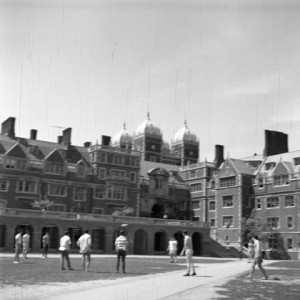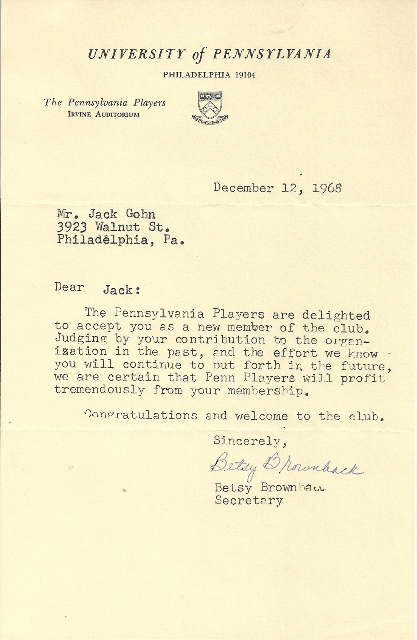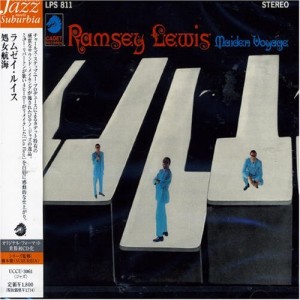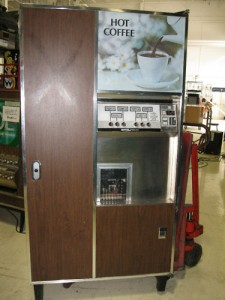Of Love and Caffeine
Theme Songs Page | Previous Theme Song | Next Theme Song
Of Love and Caffeine
Maiden Voyage, by Herbie Hancock, performed by Ramsey Lewis (1968), encountered 1968
Buy it here | See it here | Sheet music here
In late September 1968, I was writing home from college to my mom and stepdad about the breadth of the things I was studying. In Philosophy, people like Russell, Ayer, and Wittgenstein.[1] In Psychology, all about ganglia, and stimuli and responses (I wasn’t wild about the way this approach made us all resemble machines).[2] In one English course, Beowulf, Gawaine and Mallory in translation.[3] In another, Chaucer’s Canterbury Tales in the original, which I acknowledged to them was “one of the greatest books in the world.”
This was the relatively safe discussion to have with my parents. I knew that at least the literary part of my news would please my folks, as English literature was still my stepdad’s field, and had once been my mom’s.[4]
There were two other discussions I could have had with them that weren’t so safe. One I did have, one I didn’t, or not then.
The one I had, though with some difficulty, was about my new girlfriend. Naturally, there was some reticence about that, and in any event words were lacking. For all that poets and pornographers and everyone in between have tried their best to describe it, there is something about the sweetness of a first serious love affair that exceeds and eludes description. It was all-absorbing, though. More prosaically, and more to the point here, my girlfriend S. and I were “seeing each other almost just about every day,” as I wrote my friend Walter.
Overload
Tough as it might have been to put words to it, no doubt my parents were ready for that. I was of the age where that sort of thing was to be expected.[5] What I didn’t feel I could write about at all was something that should have been and maybe was obvious, which was the way that my theater commitment combined with my budding love life and my studies to overwhelm me. And as September turned into October, the theater part became the most overwhelming part of all.
I have already written that I had been given a one-acter to direct. I was learning, as had generations of student thespians before me, that as you get closer to that first performance, the available study time approaches the vanishing point. For the duration, I wasn’t studying, I was directing.[6] My little play came off the weekend of October 17. My postmortem to my friend Walter: “The play went over, at least in a small way. It suffers from almost total incomprehensibility, which mars its audience appeal.”[7]
But then I added these grim and true words: “[T]he play … took all my time, and I’m now two weeks behind in everything, with bleak prospects for the grades if I don’t shape up fast.”
I was clearly in overload. I had so much to process (throw in the disastrous Nixon election along with everything else) that by the end I had failed to communicate with my mom and stepdad for about three weeks, which provoked the predictable unhappiness.
Subterranean
So where do you go to catch up and sort out, if it’s the fall of 1968, and you’re a student at Penn, and you live in an overcrowded apartment with inadequate study space and your girlfriend is living in a dorm from which men are rigorously excluded overnight? But of course: the underground study hall in the Men’s Dorms!
 Here’s a photo I took of the exterior in the spring of 1968. This looks from the Lower Quad toward the Upper. And the sort of arcade[8] behind the young men at play is the outside of what was in those days a kind of lounge. The lounge itself was very important. Pretty much no one had his own TV, and that was where you could go if, for example, you wanted to stay current with Star Trek in the company of several dozen friends. (The real Star Trek, that is, with William Shatner and Leonard Nimoy as smooth, slim young men,[9] women in miniskirts, and cheesy sets that cost $1.95 to build.) I watched the 1968 election returns there too. But what I’m speaking of now is the room beneath that lounge.
Here’s a photo I took of the exterior in the spring of 1968. This looks from the Lower Quad toward the Upper. And the sort of arcade[8] behind the young men at play is the outside of what was in those days a kind of lounge. The lounge itself was very important. Pretty much no one had his own TV, and that was where you could go if, for example, you wanted to stay current with Star Trek in the company of several dozen friends. (The real Star Trek, that is, with William Shatner and Leonard Nimoy as smooth, slim young men,[9] women in miniskirts, and cheesy sets that cost $1.95 to build.) I watched the 1968 election returns there too. But what I’m speaking of now is the room beneath that lounge.
Talk about your basic study hall! This was a glorified corridor walled with cinder block and illuminated day and night with fluorescent lighting running the length of the lounge above, and probably of equal width with that lounge. In my memory, carrels are lined up three or four abreast the length of the room, like airline seating for the intellectually dogged. There was a more sociable study hall at the library, known informally as the Rosengarten Mixer, and not without cause. But that was for study as a social event, and in any case it kept library hours and was useless for that serious late-night swotting There was a far more plushly-furnished study hall in one of the picturesque dorm turrets nearby (visible in the middle of the photo above), but that, as I promptly discovered the wrong way, was for stretching out on something soft and falling asleep when you should be staying up and cramming some more.
Because, yes, endurance was the name of the game. And this anonymous study area, basic though it was, had one amenity critical to endurance: a coffee vending machine from the Macke Vending Company.[10] Incredibly basic: Coffee black or with heavy or light cream, with or without sugar, plus hot chocolate. No cappuccino. (If you’d mentioned cappuccino to me in 1968, I’d have stared blankly.) An incredibly basic machine with the Macke Vending label. Yet it was the fons et origo of great things. How to sing its praises?
I’d been around coffee all my life, but for whatever reason I’d never had much interest in it before. I’m not one much for drugs. Lifetime tobacco score: one cigarette, one cigar. Moderate drinker. Marijuana experimentation only a few times and long, long ago.[11] But coffee was my addiction waiting to happen, and here’s where it did.
In a sense, it parallels the love affair with drugs every other addict describes. Ecstasy those first few times, diminishing returns of bliss thereafter, lifelong servitude nevertheless.
Ecstasy
But this was my first, mad moment of infatuation. I’d wander down to that stark subterranean corridor, park my books on a carrel, and stride back the way I came in lordly fashion, back up to the Macke machine. I’d put in a quarter (I think that was the going rate), and out would come – well, I have a feeling that today I’d find it bland and unsatisfying at best, undrinkable at worst. But to me then, it was a bolt of lightning that would infuse me with a raised pulse, a sense of ecstasy, and the certain knowledge that I would be equal to the rigors of the night ahead. (All right, sometimes I had a chaser of No-Doz, but who’s counting?)
And this, I think, is the point to explain my choice of Ramsey Lewis’ version of Maiden Voyage as the Theme Song for this memory. I heard it courtesy of my girlfriend. The theorem I posited earlier, that in college records get shared, of course applied, nay, applied to the nth degree, with boyfriends and girlfriends. In the course of getting to know everything about each other, my new love and I ransacked each other’s LPs. And a gem of hers I found at around this stage was her copy of Ramsey Lewis’s album Maiden Voyage. The title song, a gentle reworking of Herbie Hancock’s 1965 masterpiece, was my ear’s full opening to the evocativeness of modal jazz.
Lewis, a consummate, powerful pianist, had all the jazz licks but he was a popularizer, not for the most part a composer like Hancock. He was as apt to raid the pop charts for inspiration as the charts written by real jazz composers. For instance, he’d had a Number 5 hit on the pop charts with a 1965 cover of The “In” Crowd, which Dobie Gray had made an R&B hit earlier that same year.[12] But in Maiden Voyage, he’d found the perfect material. If you don’t know the song, click on the link in the preceding paragraph for Hancock’s original version. It’s lyrical, yes, but it’s also got that hard ascetic bop edge. Then compare it to Lewis’ version. It’s close, but it has the lyricism amped up and the bop edge softened down.
Let me wax technical for a moment en route back to my point. Lewis has taken his basic trio (Cleveland Eaton on bass, Maurice White – yes, later the Earth, Wind & Fire Maurice White – on drums), and embedded it in heavy but powerful Charles Stepney string and chorus arrangements, with Minnie Riperton (uncredited)[13] keening in the background. This combination gives the feeling of new, unexplored horizons, a feeling that the song itself was cunningly written to evoke. Why cunningly? Well, when you listen to it in either version, you’re apt to wonder how Hancock/Lewis can wander through so many keys. Every key change sounds as if it’s taking you somewhere new. Actually, though the composition is modal and so not wedded to any key, it sticks to only four chords. Like the effect I wrote about earlier in Brian Wilson’s California Girls, it spins you around and lands you right back in the key you started with while making you feel you’ve gone somewhere else. But you, the listener, are not going to know that, unless you have keener ears than mine, are blessed with perfect pitch, or have cheated by looking at the sheet music. The secret, I think, is in the complexity of the chords; you can go anywhere with them and it still sounds like a maiden voyage rather than plying a trade route.
Well, seriously, can you think of better music for studying while high on caffeine? You want to feel that you have transcended time and space, and that your reading and your writing is taking you somewhere new and exciting. I can assure you that Ramsey Lewis’ expansive sound was very much in my head on those long, long nights, and helped me get through them, as did thoughts of my new lover, the bringer of good things who had blessed me with this celestial melody. And, of course, I was also helped by desperation about my grades.
Marathon Man
So the marathons began. On 16 November I report to my friend Walter that “I pulled four all-nighters in the last two weeks … I’m pulling a D in French at the moment. The amount of reading I have to digest is enormous… I just wish I had thirty-six hours a day.” On 5 December I write Walter: “The play did such damage to my studies that it has literally taken until the very end of classes to catch up.” On 20 December, I report to my father: “I am now in the last and longest (36 hours) of my enforced waking periods of the semester… [I] studied nine and a half hours straight [today].” That’s an awful lot of Macke coffee and Ramsey Lewis. And mind you, I was not trailing clouds of glory through this whole ordeal. To the contrary, I recall nights of sheer physical torment trying to stay awake and mentally absorbent as strange and challenging new information fought to enter my head. Being at my carrel all night also did not mean that I might not pass out with my head in my hands, only to wake between ten minutes and an hour later with pins and needles in my arms, or a crick in my neck, or some other little indignity.
But it worked. I failed nothing, escaped with only one D (as described in the notes below), and pivoted to a regimen of studies that led to a cum laude overall plus honors in my major.
There were two other effects, each of which was undoubtedly foundational to my subsequent success with the GPA.
 One had to do with Penn Players. I wrote earlier that at around this point I ended my involvement with them. In fact it was a little more dramatic, in a quiet way. On December 9, in the midst of this torrent of studies, I walked into the Penn Players offices, after a class had been canceled and I had a little bit of time on my hands. Someone congratulated me. I asked why, and was told that I had just been admitted to the Club. As I wrote my parents the next day, “I was a little astonished, inasmuch as I was not in the formal heeling program, and had not done the things you have to do to get into the Club, like selling tickets and painting sets… So apparently they’ve changed the rules – I don’t know.” Weighing whether to accept, I considered whether I wanted to commit to the minimum 30 hours a semester, and whether it was worth it just to have a say about those who would have a say in choosing the Artistic Director (the very same professor who was giving me the D) (see Note 2 below). But I knew ousting him wasn’t likely. For that reason, and others, my conclusion, with regard to this unexpected and unsought honor: “I have bigger fish to fry.” This was not meant to insult the organization; it was merely an assessment of where my priorities now lay.
One had to do with Penn Players. I wrote earlier that at around this point I ended my involvement with them. In fact it was a little more dramatic, in a quiet way. On December 9, in the midst of this torrent of studies, I walked into the Penn Players offices, after a class had been canceled and I had a little bit of time on my hands. Someone congratulated me. I asked why, and was told that I had just been admitted to the Club. As I wrote my parents the next day, “I was a little astonished, inasmuch as I was not in the formal heeling program, and had not done the things you have to do to get into the Club, like selling tickets and painting sets… So apparently they’ve changed the rules – I don’t know.” Weighing whether to accept, I considered whether I wanted to commit to the minimum 30 hours a semester, and whether it was worth it just to have a say about those who would have a say in choosing the Artistic Director (the very same professor who was giving me the D) (see Note 2 below). But I knew ousting him wasn’t likely. For that reason, and others, my conclusion, with regard to this unexpected and unsought honor: “I have bigger fish to fry.” This was not meant to insult the organization; it was merely an assessment of where my priorities now lay.
The other effect of all this study was profound. Force-feeding does fatten the goose, after all. I was beginning to think of myself as a man who’d read Chaucer and Spenser and Milton and Corneille and Sartre. It was hundreds of pages, to be sure. But, as I wrote my parents (for now I could share the whole situation with them) “Most of the stuff has been of some genuine value. In fact I discovered that, for the first time in my life, I was fighting to cope with a tide of reading that was … really significant and relevant to me.”
A Little Learned
The aha! moment came when I was consulting C.S. Lewis’ most important critical work, The Allegory of Love. I’d been a fan of Lewis’ fictions and his Christian apologetics all my life. But this was professional literary criticism. In September, that book would have been utterly incomprehensible to me; by December, I had the tools to read and understand it. As I wrote my parents, “For the first time in my life, I’ve really felt a little learned, as opposed to just well informed.”
Thanks in good measure to Herbie Hancock and Ramsey Lewis and Minnie Riperton and Macke Vending, the die was cast. I was going to be an intellectual, and not just an aesthete.
[1] With Professor James Francis Ross. I find I have absolutely no recollection of the man or his lectures, notwithstanding that I considered them “excellent” in the passage quoted above. I vaguely remember the textbooks and the experience of reading these philosophers, though I believe I also covered them with another professor, so it all gets confused.
[2] With Professor Henry Gleitman, still, incredibly, as of 2011, associated with the Psychology Department at Penn. He was already the Chair when I took that course 43 years earlier. I ended up earning my only post grade-school D in this course, a grade which to this day I don’t think I deserved. Unlike Professor Ross, Gleitman sticks in my memory, not only because of his lectures, which may have been dry but engaging, but also because he and his wife were a big deal with the Penn Players. He was directing a mainstage play when I was helming my little one-acter. In fact, I have an exchange of correspondence between us over his annoyance that I had moved a rehearsal of my little play two hours earlier, which rendered it impossible for him to see a rehearsal. Apparently he held some kind of supervisory function with Penn Players, and I was frustrating his oversight. I wonder if my D was an unconscious consequence of his annoyance? Or to put it in his terms, if his ganglia had been stimulated by our little contretemps, and this was in some way his response?
[3] With Professor Edward B. Irving, Jr., memorialized toward the bottom of the column of obituaries here. He was quite important in my undergraduate education, because of his involvement with the English Honors Program, which I shortly thereafter entered. I think I eventually read Beowulf in the original with him, at least I studied it at length with him. Somewhere I have my ms. translation of the entire poem, and if that contains clues as to the dates, showing whether the translation was done in undergraduate or graduate classes, perhaps I can update this endnote.
[4] At this point, my mother was teaching German at the college level. But she was ABD in English from the Johns Hopkins University – a subject to which I’ll return later.
[5] There were massive complications because I was Catholic and my girlfriend Jewish. The roots and branches of that will be dealt with elsewhere, but it goes without saying that that factor too complicated greatly the discussions between my mother and me. Still, discussions did occur.
[6] I recorded that Penn Players kept track of your hours devoted to the cause, and that when I had been the stage manager for a play the preceding year, I’d logged 172 hours. I’m sure I put in more as a director. I suppose, though I couldn’t know it at the time, this was good training for the logging of billable hours I’d have to do as a lawyer later on.
[7] Jean-Claude van Itallie’s War (1963), which I had seen produced as a laboratory play at the University of Michigan sometime in the previous couple of years. I felt then, and continue to feel, that the play is a ritual more than a story. The summary in Doolee.com, the Playwrights’ Database: “Two actors, one young, one old, and a bizarre lady, engage in a series of fantasy-like improvisations, articulating the relentless war which humankind is doomed to wage against harsh reality and the inexorable passage of time.”
[8] Obviously remodeled in later years.
[9] There’s a photo of the 1968 cast here, if you don’t believe me.
[10] It would appear from this summary that Macke was acquired by Allegany Beverages sometime before 1985, that Allegany was merged into Service America Corp., whose parent, Servam Corp., disappeared into the mists of bankruptcy sometime in the 1990s. This New York Times piece seems to be about as far forward as I can trace it. I would have liked to entertain the notion of Macke still catering to young scholars somewhere, but it appears that this is nothing but a wishful fantasy.
[11] And, yes, I say legalize it.
[12] Gray did not actually write the song (the honor goes to Billy Page), but Gray was its first interpreter.
[13] My source for the Riperton attribution is a William G. Stout customer review of the album at Amazon.com.
Note: Source for the coffee vending machine photo here.
Copyright (c) Jack L. B. Gohn, except for commercial images

